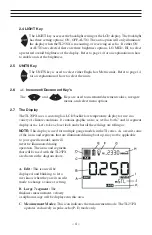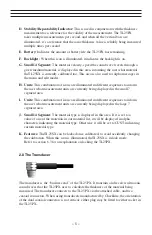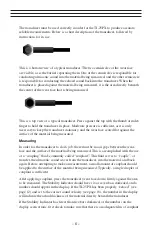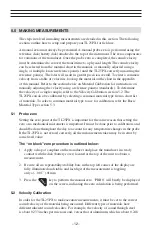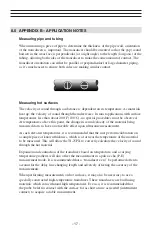
– 17 -
8.0 APPENDIX B – APPLICATION NOTES
Measuring pipe and tubing
When measuring a piece of pipe to determine the thickness of the pipe wall, orientation
of the transducers is important. The transducer should be oriented so that the gap (sound
barrier) in the wear face is perpendicular (at a right angle) to the length (long axis) of the
tubing, allowing both sides of the transducer to make the same amount of contact. The
transducer orientation can either be parallel or perpendicular for large diameter piping,
as it’s much easier to ensure both sides are making similar contact.
Measuring hot surfaces
The velocity of sound through a substance is dependent on its temperature. As materials
heat up, the velocity of sound through them decreases. In most applications with surface
temperatures less than about 200°F (100°C), no special procedures must be observed.
At temperatures above this point, the change in sound velocity of the material being
measured starts to have a noticeable effect upon ultrasonic measurement.
At such elevated temperatures, it is recommended that the user perform calibration on
a sample piece of known thickness, which is at or near the temperature of the material
to be measured. This will allow the TI-25PX to correctly calculate the velocity of sound
through the hot material.
Expansion and contraction of the transducer based on temperature, and a varying
temperature gradient, will also affect the measurement in a pulse-echo (P-E)
measurement mode. It is recommended that a “transducer zero” be performed often to
account for the delay line changing length and adversely affecting the accuracy of the
measurements.
When performing measurements on hot surfaces, it may also be necessary to use a
specially constructed high-temperature transducer. These transducers are built using
materials which can withstand high temperatures. Even so, it is recommended that
the probe be left in contact with the surface for as short a time as needed (intermittent
contact) to acquire a stable measurement.
Summary of Contents for TI-25PX
Page 1: ...MODEL TI 25PX ULTRASONIC THICKNESS GAUGE Operating Manual ...
Page 21: ... 20 9 0 NOTES ...
Page 22: ......


